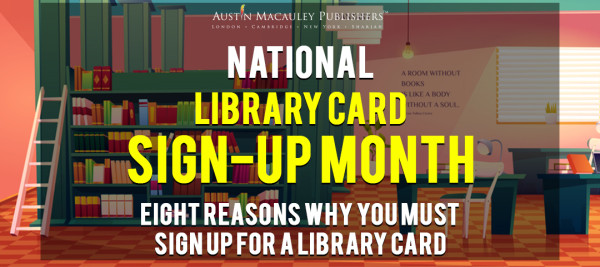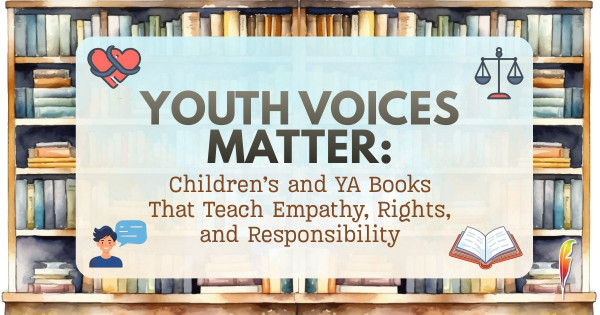
NATIONAL LIBRARY CARD SIGN-UP MONTH: EIGHT REASONS WHY YOU MUST SIGN UP TODAY
Going to libraries has remained an integral part of our culture. And this cultural project is propelled by our youth and particularly children. Realizing the significance of children’s connection to the library, Former United States Secretary of Education, William Bennett, created a campaign in 1987 today celebrated as Library Card Sign Up Month. William Bennett said: “Let’s have a campaign. Every child should obtain a library card and use it,” to which libraries all over the country responded. For many, every month is a Library Card Sign Up Month but since the new academic year starts in September, this became the ideal month to encourage more and more children to sign up for the card and unlock a universe of resources available to them. Initially meant to be for children, this campaign is now aimed at all ages
Earlier, when libraries were first introduced to the public, they were limited only to lending books—you could read them there or take them home. But as the 21st century brought enormous changes, the libraries responded in kind. No longer limited only to lending books, they provide a range of services to their patrons today.
Below outlines just a few services available to those with a library card:
1. E-books and E-readers
We know, for a booklover, the smell and touch of a printed copy is unparalleled, but one cannot take a pile of books with oneself everywhere. If you have got an E-reader, visit your library and lend some amazing E-books. But you needn’t worry if you do not have one. Most libraries have started lending E-readers now. Isn’t it great?
2. Digital Entertainment
The library isn’t just a warm place for bookworms. It’s a place every one of us can find things of our liking. You are too busy to read a book? That’s fine. Lend audiobooks from your library and listen to them as you drive or commute to and from your workplace.
3. Research and Academic Support
This is undoubtedly the biggest incentive to have a library card. If you are working on a research paper or a project, your librarian can help you with your much-needed and hard-to-find resources. Most libraries have subscriptions of a range of credible journals from which you can read top-notch, peer-reviewed articles relevant to your subject. They also have a large reservoir of newspaper archives, maps, periodicals, census data, access to paid databases, and consumer reports. If they don’t have a resource you need, they can borrow it from another library through interlibrary loan—and it’s free for you.
4. Printing and Scanning Services
If you don’t have a printer or scanner at home and you urgently need it, what do you do? Why not use the printing, photocopying, and scanning services at your library? — these are either completely free or they may charge you a nominal amount.
5. Business Development
If you wish to start a business and want someone to assist you, your library should be your desired place. According to the American Library Association, more than 6,000 public library outlets (38% of the U.S. total) provide specific assistance with the development of small business plans. If you have a low budget, you don’t need to pay a business consultant an exorbitant fee. Just head to your library and they will provide guidance about all the things which preoccupy your mind.
6. Employment Assistance Service
Public libraries also provide a workspace for telecommuters and supply free internet access for people looking for employment opportunities. They also offer job and interview training for those in need—such as teaching you how to write a cover letter, resume, or helping you practice for upcoming interviews. So much so that some libraries, such as one in New York City even lend bowties, briefcases, and handbags to people who need them for their job interview. Not only that, but you can also enroll in many skill development programs such as learning new languages, sharpening your computer literacy, or enhancing a new skill.
Libraries are community hubs in many ways. Not only do they help people find and prepare for jobs. They also offer meeting spaces, assistance with taxes and voter registration, and provide access to technology for people who lack it.
Most of us are unaware of the services libraries offer regarding healthcare. A study carried out by the Institute of Museum and Library Services found 59% of libraries help their members find health insurance resources and 18% bring in healthcare providers to offer free limited screening services. Together with local governments, healthcare providers, and medical professionals, libraries keep communities not only informed but healthier too.
Moreover, it’s the best place for children to be after school— where else can they do their homework better other than a library? Similarly, many libraries join hands with local zoos, museums, or art galleries to provide discounted admissions to cardholders.
8. Books
Lastly, books—and lots of them. As Arthur Schopenhauer, the celebrated German philosopher, once said, “desires are unlimited and the fulfilment of them is limited.” This adage is generally true, but it doesn’t hold any water when it comes to books. Are you a bibliophile who wants to devour books upon books but cannot afford every title that comes to mind? If so, the library can be the paradise you wish for in this world. It’s the only place that is equipped with all the resources required to satisfy your intellectual appetite.
How do you gain access to these benefits?
The services discussed are offered in most libraries across the United States. You can gain access to all these services simply by signing up for a library card. However, if your local library is missing any of these services, should you give up and not sign up? No—you should sign up and suggest them to provide these services. Librarians listen to their members.
How can you celebrate this month?
Here’s how:
a. First and foremost, sign up for the card yourself. Check with your nearest library, or visit their website, to learn about what they need in case you want to sign up.
b. Ask your family members and friends to sign up. Especially children—at the start of the academic year, a library card is a perfect gift for them, bringing great benefits to help them study.
c. Spread the word. Post about the campaign on social media—challenge your friends to sign up for a card. Initiate discussions with your acquaintances about it.
d. Go to your nearest library and have a look around. Thank the staff for being there, spreading and preserving the most valuable thing in the world—knowledge.
Libraries are non-profit organizations. These civic institutions are funded by the government and other private donors. They cannot point to their sales as a measure of success. Their only measure of success is the number of people who come to the libraries and register themselves. Your sign-up matters. The more the people sign up, the better your library will be funded. Sign up now and support them and your knowledge.
We use cookies on this site to enhance your user experience and for marketing purposes.
By clicking any link on this page you are giving your consent for us to set cookies












